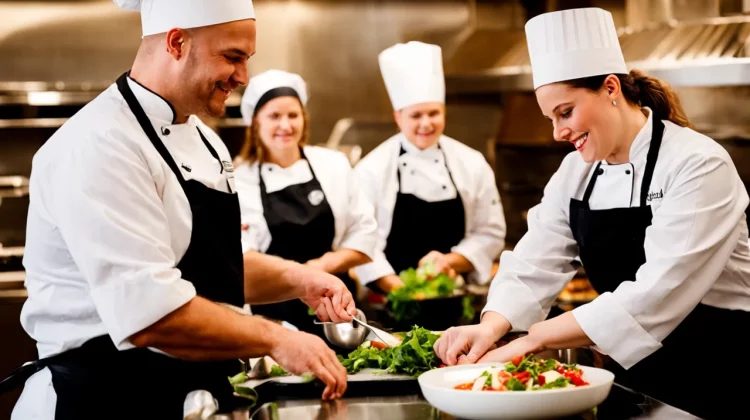
Going through a culinary journey is an exciting endeavor filled with the promise of culinary mastery and gastronomic creativity. Yet, before donning the chef’s hat and wielding the spatula with finesse, aspiring chefs often ponder a crucial question: How long does culinary school take?
The duration of culinary school varies depending on the program’s structure, intensity, and specialization. Whether you aspire to become a renowned chef, a skilled pastry artisan, or a culinary entrepreneur, understanding the time commitment required is paramount.
In this comprehensive guide, we’ll explore the intricacies of culinary education, unraveling the timelines and milestones that aspiring culinary professionals encounter along the way.
From intensive diploma programs to comprehensive degree courses, we’ll delve into the diverse educational pathways available, empowering you to chart your culinary ambitions with clarity and confidence. So, let’s embark on this flavorful journey together, uncovering the secrets behind the duration of culinary school.
1. Short and Sweet Courses
Some classes are quick, like a cooking sprint! These are called diploma or certificate programs. They might last only a few weeks or a couple of months. You focus on specific skills or types of food, like becoming a pasta pro or a dessert dynamo.
2. A Bit Longer – Associate Degrees
If you’re looking for a bit more, consider an associate degree. It takes about 1 to 2 years, like a good book series. You learn more than just cooking – there might be some general classes too. Imagine, in two years, you could be a kitchen superhero!
3. The Full Journey – Bachelor’s Degrees
For those who want the whole adventure, there’s the bachelor’s degree. This is like a 4-year quest. You dive deep into cooking, and you also learn about the business side of things. It’s like becoming a chef and a manager all in one!
4. Remember, Your Pace Matters
The time you spend in culinary school can also depend on how much time you have each day. Going full-time means you finish faster, like a bullet train. Part-time is like a leisurely stroll; it takes longer, but you still get there.
5. Bonus Round – Keep Learning
Even after culinary school, many chefs keep learning. It’s like leveling up in a game – you stay on top of new recipes and tricks. The kitchen world is always changing, so being a forever learner is a secret ingredient for success!
In a nutshell, whether you choose a quick sprint or a longer journey, culinary school is your ticket to cooking greatness. So, put on your chef’s hat and get ready for an exciting and delicious adventure.
Culinary Schools
Culinary education is often the starting point for aspiring chefs, and the journey from beginner to culinary professional is paved with success stories of those who started from the bottom. Culinary schools offer a fast-track to a new career by providing comprehensive education in a relatively short time frame. Plus, the application process is usually straightforward, making it accessible to many.
Institutions like the Institute of Culinary Education offer specialized programs like Restaurant Management, focusing on the skills needed to oversee, grow, or even own a culinary business. Similarly, at CulinaryLab Cooking School, a hybrid approach combines hands-on training with mentorship, apprenticeship, and job placement opportunities. This immersive method allows students to dive into the culinary industry quickly, gaining real-world experience under the guidance of experienced chefs.
Considering that the Bureau of Labor Statistics predicts a 10 percent growth in employment opportunities for chefs and head cooks from 2016 to 2026, there’s no better time to embark on a culinary education journey.
Types of Culinary School Programs
Culinary school programs come in various flavors: quick and specific diploma/certificate courses (a few weeks to months), comprehensive associate degrees (1-2 years), and in-depth bachelor’s degrees (4 years). Choose your culinary adventure based on how much time you want to spend in the kitchen.
Ready to Start Culinary School?
Still have questions about culinary school? We’ll be glad to help. For more information, schedule a tour, call 714-486-4406, or email us.
You’ll receive an education that sets you up for an exciting and promising future in the kitchen.
Degree Programs
A college degree offers a variety of programs for the aspiring chef. Whether you choose an “arts” or “science” approach, you will find different culinary training options at the associate’s, bachelor’s and master’s level.
- An associate’s degree can be earned in two years; bachelor’s degree in four years; master’s degree in two years (after you attain a bachelor’s degree).
- Time frame depends on how much time you can devote to school.
- Different colleges and universities emphasize different areas of the industry.
- According to the BLS, the most common course of study for aspiring chefs is an Associate in Culinary Arts Degree program.
- Financial aid, or a student loan, is often available to help with the cost of your education (i.e. loans that have to be paid back with interest).
Diploma or Certificate Programs
- A culinary school diploma or certificate program provides you with the culinary skills required for entry-level positions.
- A diploma or certificate can be earned in about six to 12 months, on average
- Time frame depends on how much time you can devote to school.
- It combines classroom learning and hands-on experience in the field of study.
- You gain real-world career experience.
- There are often financing options available to help with the cost of a diploma or certificate program (i.e. budget-friendly monthly payments).
Frequenty Asked Questions
Can you teach yourself culinary arts?
Yes, you can teach yourself culinary arts through online resources, cookbooks, practice, experimentation, and learning from experienced chefs. Passion, dedication, and practice are key to mastering culinary skills.
how long is culinary arts school
The length of culinary arts school varies depending on the program and level of education pursued. Diploma programs may take 6-12 months, while degree programs can range from 1-4 years.
